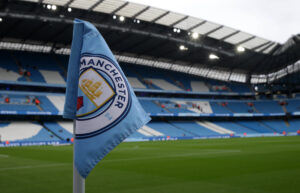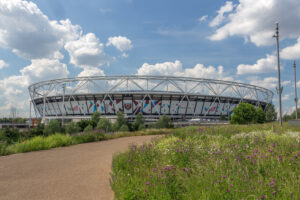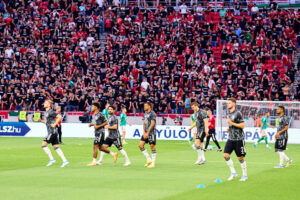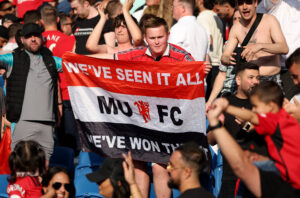In the absence of any professional football anywhere until at least the end of April, we at LWOF have been turning to the past for inspiration – and content. Consequently, in a new series, our resident historian, Martin Keady, looks at The Greatest: The Players, Managers and Matches That Made Arsenal. He begins with the Greatest Gunner of them all: Herbert Chapman.
The name itself sounds so old-fashioned now that if it is used at all it is only as a term of abuse, as in ‘proper Herbert’ (or even ’erbert’). And yet for all Arsenal fans, especially the older ones or those with a knowledge of the club’s history that extends beyond the days of Tony Adams and Ian Wright, the name ‘Herbert’ is more deserving of reverence than mockery, because it was the first, or Christian, name of the man who made Arsenal – Herbert Chapman, the original Emperor of Football and undoubtedly the greatest Gunner of them all.
The Players, Managers and Matches That Made Arsenal – Herbert Chapman
He Played for Spurs
The irony is, however, that the high-point of the greatest Gunner’s playing career was his time at Tottenham Hotspur, Arsenal’s greatest rivals and the club whose fans still maintain that Arsenal are only interlopers in north London, having originally begun as Woolwich Arsenal in the south of the capital. Having been born in Kiveton, a small Yorkshire village, in 1878, Chapman managed to avoid following his father down the local coal-mine, first by gaining a place at college to study mining engineering and then by becoming something of a journeyman footballer, playing for a succession of different clubs around England, from his hometown team of Kiveton Park to the far more glamorous Spurs in London. At Spurs, he played as an inside forward (a position on the field that is now as old-fashioned as his name) between 1905 and 1907, scoring a respectable 16 goals in 42 games.
The First Real Football Manager
Of course, it was as a manager, rather than as a player, that Herbert Chapman would truly find his footballing calling. He began as a player-manager at Northampton Town, who he had joined after leaving Spurs. Even as a player-manager his impact was immediate because he became probably the first-ever football manager in the way that we understand the job today, more than a century later. In particular, he was probably the first manager in England, if not the world, who really introduced the concept of tactics to the game. As Chapman himself repeatedly said afterwards, before he became a manager football was largely played off the cuff, with little thought given to a team’s shape or formation, especially when they did not have the ball.
Instead of that freewheeling approach, Chapman began applying to football some of the basics of structural engineering that he had learned as a student, in particular putting more men in midfield (a concept that did not even really exist at the time, as players were essentially divided up into either backs or forwards), which both shored up the team defensively and freed up more space in attack. Eventually, the results of this more thoughtful, considered and tactical approach were revolutionary.
The Scandal at Leeds
Chapman showed great promise at Northampton, almost taking what was then a non-league club into the professional ranks, and consequently, he earned himself a move in 1912 to a league club, in the form of Leeds City (the original Football League team in Leeds). However, the onset of World War One prevented him from making as instant an impact in Leeds as he had achieved in Northampton. Then, after the war, came the scandal that almost ended his managerial career before it had really begun.
As Chapman’s many biographers, including most recently Patrick Barclay, have discovered, more than a century on from the scandal at Leeds City, it is almost impossible to determine exactly what happened. Suffice to say that Leeds were accused of making illegal payments to players, during wartime games at that, and as the manager at the time, Chapman was one of five club officials who were banned from football for life, while the club itself was wound up and eventually replaced by the newly formed Leeds United.
Resurrection at Huddersfield
Chapman might have been lost to football forever, until Huddersfield Town approached him to become their assistant manager and duly appealed against his lifetime ban, arguing (on the basis of what some would later call a mere technicality) that he had not actually been in charge at Leeds City when the illegal payments were supposedly made. To the surprise of many in football, the ban was overturned and Chapman duly returned to football management, albeit as a mere assistant to begin with.
So great were Chapman’s subsequent achievements at Arsenal that his time at Huddersfield is often forgotten, or at least overlooked. And yet, to illustrate the scale of his achievements at the Yorkshire club, a direct comparison can be made with another truly great football manager, Sir Alex Ferguson. For all of Ferguson’s magnificent achievements with Manchester United, arguably he achieved even more, and with far fewer resources, with Aberdeen, with whom he broke up the Old Firm monopoly of the Scottish title and even won a major European trophy, the 1983 Cup-Winners’ Cup, beating Real Madrid in the final. Similarly, after he eventually became the manager at Huddersfield, Herbert Chapman set the unfashionable (then as now) Terriers on the path to an extraordinary hat-trick of Football League titles between 1924 and 1926. It was the first time that any English club had won three titles in a row and to this day, nearly a hundred years on, only three other much bigger clubs have achieved the feat, namely Liverpool (1982-84), Manchester United (1999-2001, and 2007-09) and, under the stewardship of Chapman himself, Arsenal (1933-35).
And the Glory Years at Arsenal
It was Chapman’s achievements at Huddersfield that first attracted the interest of Arsenal, who had won nothing in the first 40 years of their existence, either south or north of the River Thames. He joined the Gunners in 1925 and at first, it appeared that he had made a terrible mistake, especially when Huddersfield, under the leadership of his replacement Cecil Potter, made it a hat-trick of titles in 1926. Again, the comparison can be made with Sir Alex Ferguson. Just as Ferguson initially struggled at Manchester United when he moved from Aberdeen in 1986, taking four years to win his first trophy (the FA Cup in 1990), so Chapman did not enjoy immediate success at Arsenal. However, in 1930 Chapman’s Arsenal finally won their first trophy (the first in the club’s history), beating his old club Huddersfield 2-0 in the FA Cup final.
What followed was truly historic, making Arsenal the world’s first world-famous football club, as proven by the fact that even today there are still probably even more clubs around the world, from Argentina to Ukraine, called ‘Arsenal’ than there are ‘Reals’, notwithstanding Real Madrid’s early domination of the European Cup in the 1950s. Had there been a European Cup in the 1930s, as Chapman himself passionately lobbied for (along with the introduction of floodlights for night-time matches and other genuinely historic innovations), his Arsenal team would almost certainly have won it, as they were comfortably the best team in England in the 1930s, winning five titles in total in that decade, including the aforementioned hat-trick of titles between 1933 and 1935.
As it was, Arsenal had to ‘settle’ for winning the World Cup, as they effectively did (or so their oldest and most one-eyed fans will tell you) in November 1934 when an England side with no fewer than seven Arsenal players in the starting XI and playing at Highbury defeated the Italian side that had won the actual World Cup on home soil just a few months earlier.
The Tragic Death
Tragically, Herbert Chapman himself did not live to see that remarkable and genuinely historic achievement, nor indeed any of Arsenal’s other triumphs in the second half of the decade. That was because he had died in January 1934, the result of contracting pneumonia while watching an Arsenal third-team match in the rain. As many said at the time, and as many more have said since, it was a testament to Chapman’s complete and utter devotion to football in general and to Arsenal, the club that he turned from also-rans into virtual world champions, in particular. And the fact that hundreds of thousands of people (not all of them Arsenal fans) lined the streets of north London as his body was taken to the funeral was a testament to their admiration of the first truly great football manager.
Main Photo






